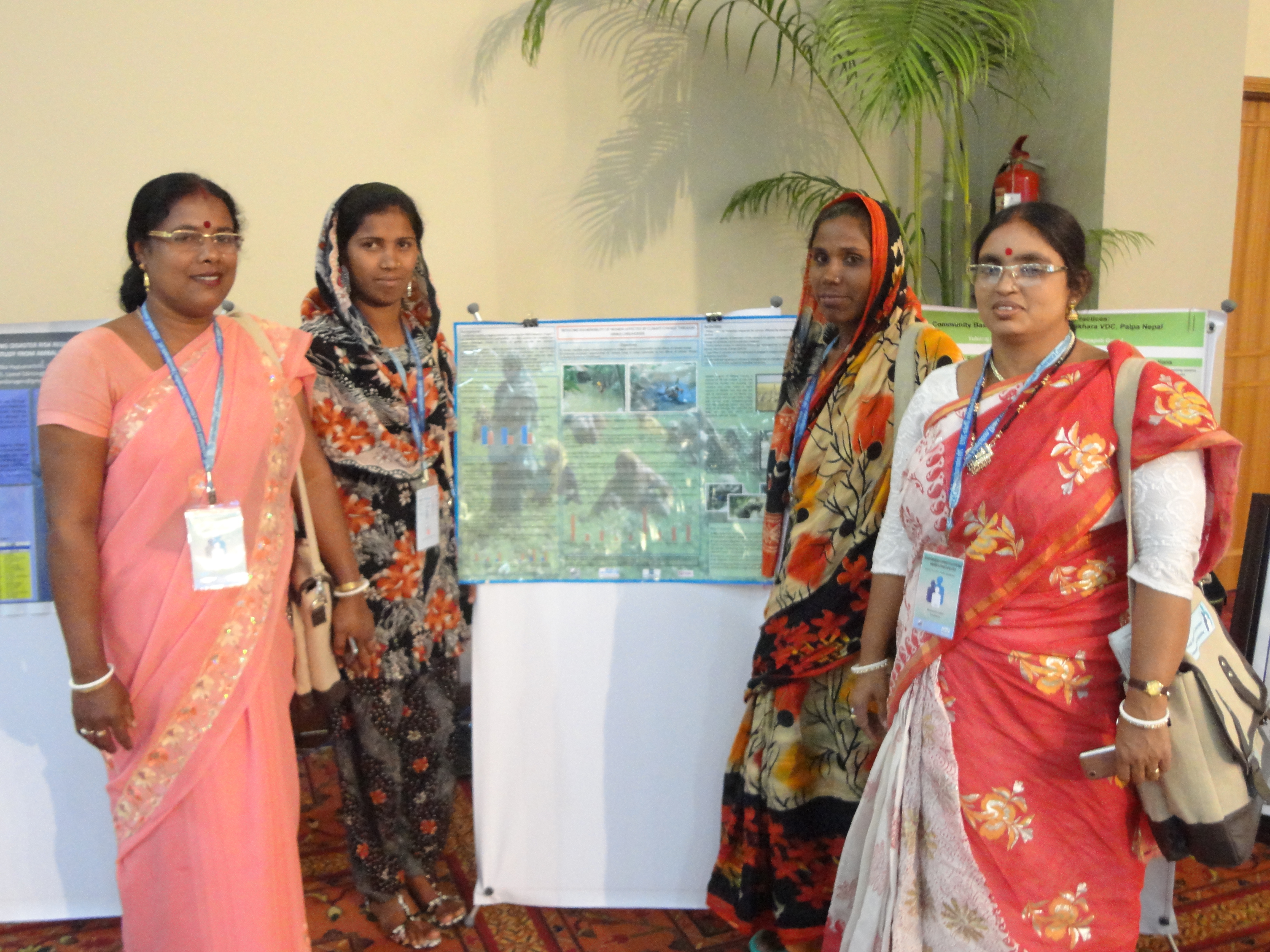Caption: Helena (second from left) and Karia (second from right), along with local government representatives of their areas, pitching their project at the CBA7 Conference on Climate Change Adaptation in Dhaka, the Bangladesh capital.
By Lusana Anika Masrur
The stories of Karia and Helena are not the “rags to riches” kind, yet they carry important messages of perseverance, hardship and resilience. The struggles embedded in their lives represent microcosms of various social challenges that plague the developing world today.
Residing in a remote Bangladeshi village in the Batiaghata sub-district of Khulna, 31-year-old Karia Begum is a mother of two whose husband left her and married another woman while she was still pregnant. She has since been trying to make ends meet by working odd jobs in manual labor. Karia reflects that although her family had a steady source of income when she was with her husband, she will never go back to him.
From a nearby village, Helena Begum’s story is similar. Married when she was ten or eleven, she divorced while still a teenager because her husband tried to murder her so he could be with a new wife. At the age of 18, she was left to fend for herself as a poverty-stricken single mother. She shudders when she remembers her painful days as a child bride.
Despite being handed the short straws in life, their hardships have also taught both these brave souls important lessons. Most of all, they learned that even the most destitute members of a society are valuable and that they have the ability to take control of their lives. BRAC, the Bangladeshi NGO founded in 1972 and formerly known as the Bangladesh Rural Advancement Committee, was fortunate to walk with them on their journey to self-empowerment.
Living in a country that is alarmingly exposed to the impacts of climate change, these women from Bangladesh’s southern regions represent some of the country’s most vulnerable people. Their homes and livelihoods face a constant threat from cyclones and floods, as well as both soil and surface water salinity. Karia and Helena represent just two of thousands of victims devastated by cyclones in the last decade, whose repercussions are still felt in affected communities today.
With these pressing issues in mind, and the concern that women are significantly more affected by natural disasters than men, BRAC’s disaster, environment and climate change (DECC) program recently launched a new initiative aimed at reducing the vulnerability of women affected by climate change through viable livelihood options. A combined effort of the DECC program, the Norwegian Embassy and other partners, the initiative aims at alleviating the status of many others like Karia and Helena by granting them a voice and providing them with a sustainable livelihood option, thereby increasing their social mobility.
The project organized 400 “disaster resilience groups” (of which 400 more will be formed) consisting of 25 women members, each from extremely poor households in vulnerable parts of the country. Five of the most promising members of each group received grants for sustainable livelihoods along with technical assistance to launch a business. Karia and Helena both received such grants. Others also had much to gain; group activities offer them training on disaster resilience and leadership skills, while providing a nurturing support structure.
For grant recipients like Karia and Helena, who are now proud businesswomen, the benefits have been even more significant. One of them is currently in charge of a rice processing mill while the other one has set up a neighborhood retail shop.
When asked about her hopes and dreams, Karia replies, “My life is over, but my children are my future. I want them to grow up without fears, become educated and follow their dreams. Until recently, I used to think that these were empty hopes… but now they are coming true!”
Helena shares similar thoughts. “All the obstacles God gave me in life were for a reason. It may not be so that I could get the life I wanted, but it is so I could give it to my girls.”
Women like Karia and Helena are role models to others not just in their society, but to women everywhere. The sad truth is that they still remain exposed to the next major storm, both literally and figuratively. They are, however, hopeful and built of substance hardened to endure whatever comes their way. Underneath their tough exteriors are delicate flowers that have risen from the ashes to bloom.
While the rest of the world may remain unaware of their plight, Karia and Helena’s resilience in the face of adversity will remain silent testaments to the spirit of survival that lies deep within all of humankind.
Lusana Anika Masrur is a senior sector specialist for BRAC’s disaster, environment and climate change program, based in Dhaka, Bangladesh.
Source: Huffingtonpost










